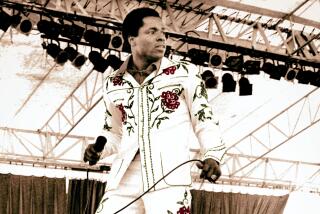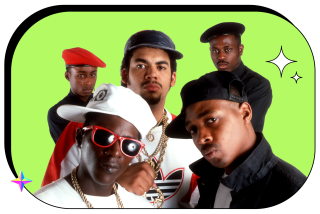INDUSTRY OVERVIEW: FLASH DOWN, PROFITS UP
- Share via
No album in 1986 achieved the staggering sales figures of Michael Jackson’s “Thriller” or Bruce Springsteen’s “Born in the U.S.A.,” but the music industry made up for it in the sheer number of hits.
Whitney Houston’s debut album “Whitney Houston” was the year’s top seller, with U.S. sales of 5 million copies (in addition to the 2 million it sold last year). No other album sold 4 million copies this year, but 10 others sold 3 million or more.
But if 1986 wasn’t a particularly flashy year for the music business, it was a solid and profitable one, according to a Times survey of retailers and manufacturers. The best news for the industry was the swift consumer acceptance of compact discs and the brisk sales of Springsteen’s five-record set, “Live/1975-85.”
Overall, unit sales are expected to be about even with last year, but dollar volume is expected to be up. That’s because CDs are priced higher than vinyl LPs, which are declining in popularity.
The Recording Industry Assn. of America reported that 278.6 million units were shipped in the first half of 1986, a 6.9% drop from the same period of 1985. Net dollar volume for the first half of the year totaled $1.952 billion, up 1.1%.
Unit shipments of vinyl LPs and EPs--lumped together in the trade association’s figures--dropped by nearly 25% in the first half of the year, while unit shipments of CDs soared by nearly 150%. Shipments of prerecorded cassettes--still the industry’s dominant format--inched up by about 2%.
In 1985, the industry shipped 653 million units, at a combined value of $4.388 billion.
Patricia Heimers, a spokeswoman for the New York-based association, sees 1986 as a “flat” year. “Basically there’s just been a shift in the configuration of choice. More people are choosing cassettes and compact discs over black vinyl.”
Russ Solomon, president of the 40-store Tower Records chain, agreed. “We don’t measure unit-against-unit,” he said. “I’m not sure it matters. Dollars are what counts, and dollars are up.”
The music industry reached a peak in 1978 with the success of the sound track LPs to “Saturday Night Fever” and “Grease,” but then went into a deep slump in the early ‘80s. The release of “Thriller” four years ago began a major recovery, which continued with the release of Lionel Richie’s “Can’t Slow Down,” Springsteen’s “Born in the U.S.A.,” and Prince’s “Purple Rain.”
All four of those albums--released in a span of just 18 months between December, 1982, and June, 1984--topped 9 million in U.S. sales. While no albums since then have hit that sales level, some executives suggest it’s better for the industry to have sales spread out among many different titles than centered on blockbusters.
“I think it makes for a healthier business,” said Lou Dennis, Warner Bros. Records’ vice president of sales. “It’s not good when your eggs are all in one basket. You shouldn’t depend on one act for your sales volume, because there’s no guarantee he’s going to repeat that kind of success.”
The fact that 11 albums sold more than 3 million copies this year underscores the diversified tastes of the American record-buying public. The year’s triple-platinum hits ranged from Barbra Streisand’s lushly orchestrated “The Broadway Album” to Bon Jovi’s heavy metal smash “Slippery When Wet.”
The other albums to top 3 million in U.S. sales this year: ZZ Top’s “Afterburner,” Van Halen’s “5150,” Janet Jackson’s “Control,” Madonna’s “True Blue,” the “Top Gun” sound track, Lionel Richie’s “Dancing on the Ceiling,” Boston’s “Third Stage” and the Springsteen boxed set, which has sold 3 1/2 million copies since its release last month, according to CBS.
Six other albums topped 2 million in U.S. sales during 1986: Dire Straits’ “Brothers in Arms” (bringing its two-year total to 5 million), Heart’s “Heart” (bringing its total to 4 million), Sade’s “Promise,” Run-D.M.C.’s “Raising Hell,” Genesis’ “Invisible Touch” and Huey Lewis & the News’ “Fore!”
Several major record companies--including industry leaders CBS and Warner Bros.--reported record earnings in 1986. The performance of CBS Records, which expects record revenues and profits in 1986, looks to be one of CBS’ few bright spots in a year that included plummeting network-TV revenues and a widely publicized fight for corporate control. CBS spokesman Bob Altschuler said 1986 may be the record division’s best ever. And Lou Dennis said this has been Warner Bros.’ best year in both volume and profits.
This is true despite the fact that the latest album by Prince--Warner Bros.’ hottest act just two years ago--was a relative disappointment. The album, “Parade,” stopped at platinum (sales of one million).
“Parade” wasn’t the only--or even the biggest--sales disappointment in 1986. Paul McCartney’s “Press to Play,” his first album in nearly a decade for Capitol Records--the Beatles’ old label--stalled at No. 30 on the weekly charts. That was the worst showing of his solo career.
New albums by Billy Squier, Barry Manilow, Asia, Chaka Khan and Chicago also fell far short of their former sales levels. In Chicago’s case, it was particularly surprising because their previous album, “Chicago 17,” was their all-time biggest hit, selling 4 million copies and spinning off four Top-20 singles.
Several long-dormant acts returned to active duty in 1986, including the Monkees, the Moody Blues, Paul Simon and James Brown. The Monkees staged a successful summer concert tour, and last month placed seven albums on Billboard magazine’s Top-200 album chart. The Moodies and Simon both returned to the Top 10 after having been written off by much of the industry following poor sales of previous albums. And James Brown landed his biggest pop hit in more than 20 years as “Living in America” from “Rocky IV” muscled into the Top 5.
Among the year’s other surprises: the return to the Top 30 of Ben E. King’s “Stand by Me” and the Beatles’ “Twist and Shout” after they were featured in hit films; the emergence of the kid sister of an exiled pop superstar (Janet Jackson) and TV’s reigning male fashion plate (Don Johnson) as hit recording artists; and the instant acceptance of Boston’s “Third Stage,” even though more than eight years had elapsed since the group’s last album.
More to Read
The biggest entertainment stories
Get our big stories about Hollywood, film, television, music, arts, culture and more right in your inbox as soon as they publish.
You may occasionally receive promotional content from the Los Angeles Times.










